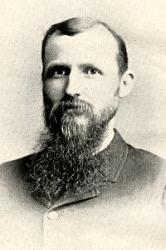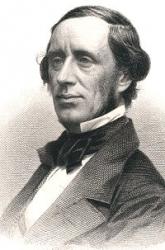Planning worship?
Check out our sister site, ZeteoSearch.org,
for 20+ additional resources related to your search.
- |
User Links
Person Results
Ephriam S. Widdemer
Person Name: E. S. Widdemer Composer of "ENON" in The Standard Church Hymnal
Ephriam S. Widdemer
Theodor Werner
1892 - 1973 Translator of "Abide with me: fast falls the eventide (Bleib bei mir, Herr! Der Abend bricht herein)" in Evangelisches Kirchengesangbuch
Theodor Werner
Joseph Herl
b. 1959 Arranger of "ABIDE WITH ME" in Hymns and Devotions for Daily Worship HERL, JOSEPH, AAGO, ChM (b. 1959): B.A. (Music), Concordia College, New York; M.Mus. (Organ), North Texas State University; Ph.D. (Musicology), University of Illinois at Urbana-Champaign; Professor of Music at Concordia University, Seward, Nebraska and organist of Redeemer Lutheran Church, Lincoln, Nebraska. Author of Worship Wars in Early Lutheranism (Oxford University Press, 2004); choral and organ music published by Oxford, Concordia, and MorningStar.
Joseph Herl, from In Melody and Song, Darcey Press, 2014
Joseph Herl
E. S. Widdeman
Person Name: Rev. E. S. Widdeman Composer of "ENON" in Hymns and Tunes
E. S. Widdeman
D. E. Dortch

1851 - 1928 Composer of "[Abide with me! fast falls the eventide]" in Dortch's Gospel Voices No. 1 Born: March 5, 1851, Theta, Tennessee.
Died: November 9/11, 1928, Tennessee.
Buried: Rose Hill Cemetery, Columbia, Tennessee.
Dortch was teaching music in Maury, Tennessee, in 1880, and was working as an evangelist by 1886. His works include:
Tidings of Joy (Columbia, Tennessee: 1878)
National Tidings of Joy (Nashville, Tennessee: National Baptist Convention of America, 1878)
Gospel Melodies, with William Dale & Charles Pollock (Nashville, Tennessee: Cumberland Presbyterian Publishing House, 1890)
Spirit and Life, with Edmund Lorenz (Dayton, Ohio: Christian Publishing Association, 1893)
Choice Songs (Nashville, Tennessee: National Baptist Convention of America, 1894)
Gospel Voices (Nashville, Tennessee: South-Western Publishing House, 1895)
Gospel Voices No. 3 (Columbia, Tennessee: David E. Dortch, 1902)
Hymns of Victory, Parts 1 and 2 (Columbia, Tennessee: Dortch Publishing Company, 1905)
Happy Greetings to All (Charlotte, North Carolina: Dortch Publishing Company, 1916)
© Cyber Hymnal™ (www.hymntime.com/tch)
D. E. Dortch
William Sterndale Bennett

1816 - 1875 Person Name: W. Sterndale Bennett Composer of "[Abide with me; fast falls the eventide]" in The Church Anthem Book William Sterndale Bennett, born in Sheffield, England, April 13, 1816, died in London, Feb. 1, 1875. His father, an organist, died when he was three years old, and his education was cared for by his grandfather. At the age of eight (1824) he entered the choir of King's College Chapel at Cambridge, where his grandfather lived, and in 1826 was sent to London to study at the Royal Academy of Music. Here he studied composition under Lucas and Dr. Crotch, and pianoforte, first under W. H. Holmes, and then under Cipriani Potter. His first composition of note was his D minor pianoforte concerto, op. 1, written in 1832 and played by himself at the prize concert at the Academy in 1833. Mendelssohn was present and greatly encouraged the young composer. In 1836 the firm of Broadwood offered to pay his expenses for a year's study in Leipsic; here he came under the influence of Mendelssohn and Schumann, both of whom held his talent in high esteem. He came back to London after the specified year, but returned to Leipsic for another year's study in 1840. In 1843 he began to give successful chamber concerts in London, and in 1844 married Mary Anne Wood, daughter of a captain in the Navy. In 1849 he founded the London Bach Society, one of the results of which was the first performance in England of the Matthew Passion, April 6, 1854. In 1853 he was offered the conductorship of the Leipsic Gewandhaus concerts, and in 1856 he was elected to the chair of musical professor at the University of Cambridge, and shortly afterwards received the degree of Mus. Doc. In 1856 he was also made permanent conductor of the Philharmonic Society, a post which he resigned ten years later to become principal of the Royal academy of Music. In 11867 he received the Cambridge degree of M.A. and a salary of 100 pounds was joined to his professorship. In 1870 the University of Oxford conferred upon him the honorary dgree of D.C.L. He was knighted in 1871, and a scholarship was founded at the Royal academy of Music out of subscriptions to a public testimonial to him in St. James's Hall in 1872. He died after a short illness, and was buried in Westminster Abbey. Bennett has been called the first English composer of individual genius since Purcell; he certainly was the first English composer who go any real recognition in Germany. He has generally been considered as a follower and imitator of Mendelssohn, although the best English critics deny this. Yet he may truly be said to have held more by Mendelssohn than by Schumann. His compositions are noteworthy for an easy grace, refinement, and elaborate perfection of style.
Cyclopedia of Music and Musicians by John Denison Camplin, Jr. and William Foster Apthorp (Charles Scribner’s Sons, 1888)
https://archive.org/details/cyclopediaofmusi01cham/mode/2up
William Sterndale Bennett
Chris Fenner
Arranger of "ABIDE WITH ME" in Hymns and Devotions for Daily Worship B.A., Western Michigan University (2003); M.A., The Southern Baptist Theological Seminary (2011); M.L.I.S, University of Kentucky (2017). Digital Archivist at The Southern Baptist Theological Seminary. Editor of The Psalms, Hymns, and Spiritual Songs of Isaac Watts (2016), Spurgeon's Own Hymn Book (2019), Amazing Love! How Can It Be: Studies on Hymns by Charles Wesley (2020), and Hymns & Devotions for Daily Worship (2024). Volunteer editor for Hymnary.org; contributor to the Canterbury Dictionary of Hymnology; founder and editor of Hymnology Archive (hymnologyarchive.com).
Chris Fenner
R. W. Dixon
1806 - 1876 Composer of "[Abide with me! fast falls the eventide]" in The Spirit of Praise Dixon, Robert William. (Wapping, Middlesex, England, c.1805--December 6, 1876, Hastings, Sussex).
"To R.W. Dixon, Esq., J.P. and D.L. (Fellow of the Hist. Soc. of Gt. Br.), for a large number of must tuneful and original compositions from his private MSS."
-Preface, Burney Tune-Book. (1875). London: F. Pitman. [CASTLE EDEN is #168]
See also: http://freepages.genealogy.rootsweb.ancestry.com/~elliff/p3.htm#i563 for Elliff name and variants in the UK for census information, which lists his occupation as follows:
Occupation 7 Apr 1861 J.P. & Commissioner of Taxes. (1861 Census Returns - RG9/3701).
--In part from DNAH Archives.
R. W. Dixon


 My Starred Hymns
My Starred Hymns

